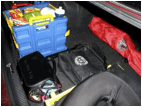Wow! Summer vacation is right around the corner. I’m sure we all can become overwhelmed with the hustle and bustle of chauffeuring our children back and forth and to all the end of school events. Let alone commuting to your own appointments; the last thing most of us are thinking about is keeping our car clean and organized. After all, being that high profile chauffer to those daily and extracurricular activities can be very tasking. It isn’t until a friend you haven’t seen in ages comes up to your car you feel embarrassed. Then you get a frightful look on your face when you realize it looks like you’ve lived in the car for the past 6 months. You say to yourself I’ve got to clean this car.
Don’t fret you still have time to get your car ready for the summer. Keeping your car organized can make your travel time less stressful. Here are some helpful tips below:

Enjoy your summer! Happy Organizing.
As a Professional Organizer, one of my favorite tools is my label maker. With one little machine you can create oodles of labels in different fonts, colors and even add borders. However, can you create a label without a label maker? Absolutely! Check out these other creative and perhaps “new to you” ideas to keep all of your favorite things in place:
The additional ideas listed below are brought to you courtesy of Martha Stewart and her new Home Office line at Staples. What can’t that woman do!
Whatever your preference or style there is a labeling option out there for you…even if it’s as simple as a Post-It and Sharpie! Happy Labeling!
In my work organizing finances and paper for aging adults and people with chronic illnesses and disabilities, certain problems tend to recur. Among them are:
Here are five different web sites I have found useful in addressing these issues:
Better World Books (http://www.betterworldbooks.com/)
Several years ago, I helped close out an estate that included nearly one thousand books. They were heavily concentrated in engineering subjects, and varied in age from 15 to 100 years old. The owner was emphatic that they not simply be recycled or buried in a landfill, and that they should benefit people in need if at all possible. Better World Books provided the way to grant these wishes. This organization is a huge on-line used book store. They accept any size donations of books, and try first to sell them through the web site. Proceeds are used to fund literacy programs around the world, but, even more important to my client, books not sold through the web site are actually shipped to third-world countries that can use them. Only when these two alternatives are exhausted are the books recycled—and never sent to a landfill. Better World’s staff was extremely helpful, and taught me how to inventory and package the books. Better still, they sent a tractor trailer to the site to pick the books up and transport them to the Better World facility, all at no charge to my client or me.
Care Calendar (http://carecalendar.org/)
In the site owners’ own words, “Care Calendar is a web based system to organize meals and other help for families during a time of illness or life changing event, such as the birth of a baby or death of a family member. “ It allows a family, group of friends, or organization to coordinate care for an individual in need by posting and responding to assignments such as meals, visits, rides and errands. Currently, I am using Care Calendar to coordinate care for a frail elderly woman living in her working daughter’s home. I posted the mother’s needs on the web site, and friends and family members have responded to fill every assignment. Care Calendar greatly reduces the need for phone calls and follow-ups, as the site forwards me and the care recipient a list of upcoming assignments and volunteers on a daily basis. The service is offered free of charge, and donations are invited.
Get Human (http://gethuman.com/)
Did you know you can talk to a live human being at Amazon or Ebay? Get Human enabled me to do just that. The site provides free direct-dial contact numbers for over 8,000 businesses, along with other direct contact avenues such as call-backs, live chat and email.
It’s Deductible (http://turbotax.intuit.com/personal-taxes/itsdeductible/)
How do you know how much to deduct as a charitable contribution on your taxes when you give away a mountain of things? It’s Deductible, a free online service from the makers of TurboTax software, combs the internet for actual selling prices of commonly-sold items. The site allows the user to create lists of items donated, by charity, by date, and then provides the fair market value for the item. Where prices aren’t available, guidelines on establishing the FMV are provided. At tax time, the lists can be printed out or imported into TurboTax. I have been using this service for myself and for my clients for nearly ten years, and have yet to be challenged by the IRS.
Medicare’s Nursing Home Compare (http://www.medicare.gov/default.aspx, then select Resource Locator/Nursing Home Compare)
Three years ago, this free service quickly allowed me to find nearby nursing homes and compare them on a host of relevant features when my father suddenly became too ill for me to care for him in my home. I found a wealth of excellent advice that enabled me to make a rapid decision with confidence. A similar comparison feature is available for Home Health Care in the same Resource Locator menu.
Did I mention that all of the above sites do what they do for free? If you or someone you care for is facing worsening illness, down-sizing or simple frustration contacting businesses, give one of these sites a try. I’m confident they’ll help you as they’ve helped me and my clients.
Children all over the country are excited about the end of school. Their visions of having endless free time fill their minds, while parents scramble to figure out what to do with their children during this free time. May-June can be a time of great stress to parents, but with proper organization, the transition can flow smoothly. Below are a few tips to help with this transition:
School Papers and Supplies
– When school ends, help your child decide which beautiful works of art should be saved, and which could be discarded (or sent to Grandma and Grandpa for their refrigerator). Hold up three pictures, and ask them to select one for keeping. Then repeat this process until only the best ones are left. Taking photos of school projects can help preserve the memory and save space in your home.
– If you prefer to keep important test papers, research projects, and paperwork from the year, decide where you will store them. Try to recycle as much of it as possible.
– Go through your child’s school supplies, and decide what can be reused next year and what needs to be tossed or donated. Keep the reusable supplies together, for easy access in September. There is no need to purchase duplicate supplies year after year.
Home Organization
– It’s that time of year again to sort through your child’s closet, pack away the winter clothes and pull out the summer clothes. Check for size, and pull out any clothes, shoes, etc., that are too small. Decide what to do with clothes that are too small – donate, save for another child, or find a new home. Keep some clothes out for cooler weather, just in case.
– Set up your home for summer activities, such as a drawing area, a reading nook, a place for playing games, and other activities of interest. Check the backyard for poison ivy, and clear out debris. Check the children’s sports equipment and bicycles for safety, and make any necessary repairs as soon as possible.
Summer Camp
– Keep brochures of summer camps and special programs together. Compare the dates with your family calendar, and once the decisions are made, recycle the ones which are not used.
– Gather all required camp medical forms, and mark due dates on your calendar. If your child is due for an annual checkup, schedule the appointment before the medical forms are due. Bring all medical forms to your appointment, so the pediatrician can fill out all of the forms at once. If your child does not need an appointment, send the medical forms to the pediatrician to fill out.
Communication
– Communicate with the parents of your children’s school friends, to find out what their children are doing. Perhaps you can arrange to send your child to the same day camp as his or her school friend, to reinforce the friendship.
– Collect addresses of your children’s friends. If you travel, your child can send postcards to maintain a connection.
Enjoy your time with your children. Summer vacations will not last forever, but the memories you share, will!
It can be a challenge to keep on top of our stock of supplies, especially those things that are used in the background of our busy lives. While we run to keep up with kids, new gadgetry and demanding jobs, we grab new products along the way, push the old stuff to the back and, before we know it, our cupboards are overflowing with “I-don’t-know-what.”
Seasonal clean-outs are cyclical opportunities to address some of the ‘stuff’ of our lives that have outlived their expiration dates. “Spring Cleaning” is a perfect time to go through some of our familiar-yet-forgotten supplies. To name a few: cosmetics, medications and spices are some accoutrements of our daily lives. And, while these staples can last a long time, they rarely last forever and require an occasional review to curtail and maintain our collections.
Cosmetics:
Did you know that makeup and lotions have expiration dates? Sometimes we collect extra cosmetics because of a good sale, a one-time whim or phase, or because we receive samples. After a while, it’s easy to forget exactly what we have, and even where we have it. To address this issue, set up a staging area – a made-bed with a towel (not your favorite) laid out to absorb any leaks. Then go on a treasure hunt. Check bedroom and bathroom drawers and cabinets to find all your makeup, lotions, and perfumes and gather them to your stage.
Begin by weeding out the items that you know you will never use again:
Check the expiration dates of the keepers before returning them to their containers. If you can’t find the date, this website will help: http://checkcosmetic.net/.
Medications:
Prescription drugs or over the counter, it is important to go through your stock of medications at least annually. It can be confusing and dangerous to keep medications around that no longer work for you or are not compatible with your other meds. Clear the kitchen table and empty out all your medications from one cabinet. (Unlike toiletries, it is best to tackle these items one area at a time so as not to mix any medications up). Dispose of the drugs that have expired and the ones that you are no longer supposed to be taking – expired or not. Return the drugs you will keep to their cabinet, keeping over-the-counter drugs separate. As for the rejects, it is important to be responsible about their disposal. Many medications have safe disposal methods posted right on the containers. Some medications are flushable. Others can be thrown in the trash after mixing them with coffee grinds or kitty litter first (to ensure that some unsuspecting animal or child does not consume them). Protect yourself by removing any identifying labels before discarding the container. Visit the FDA website for more about safe drug disposal and the DEA website to find out about prescription drug “Take Back Days” in your community.
Spices:
Whether you’re an avid gourmet chef, a casual Rachel Ray, or the microwave queen of the east coast, I’ll bet you have a few spices in your kitchen. And, unless you are a college student just starting out, I’d also bet that they’ve been there for a few years. This is okay since most spices have a shelf life of up to five years. As you can see I said five, not fifty. Ok, so they’re sitting there not hurting anyone – big deal. Well they are also taking up lots of cupboard space that could possibly be better used for getting some of your more current inventory off the countertops. Also, just because you haven’t touched them in years doesn’t mean that they’ve remained untouched. Spices are edible and if you’re not going to eat them, there may be a bug or two that would be happy to help. On their websites, spice companies have guidelines as to how long a spice is good. Some containers are marked with expiration dates. Here are a couple of quick decision makers:
For more information about how long to keep your spices visit the McCormick website or SpiceAdvice.com
What is the smallest spot most of us need to organize? Our purse or wallet. Purses are command-central-on-the-go for most women. Sometimes they are aid stations for other family members. Purses can lend their style and their function to the overall first impression we form of a person. We take these necessary accessories for granted, and we might be guilty of making these mistakes that sabotage our efforts to stay organized:
1. Too big. A purse that could be used to regularly smuggle small children causes all sorts of problems, like poor visibility and aching backs. Rooting around in the bottom of something the size of a hot air balloon is about as sexy as digging into the bottom of a large bag of popcorn. Wikipedia states Parkinson’s Law as “Storage requirements will increase to meet storage capacity.” The larger your purse gets, the more stuff you are likely to pack into it.
2. Too small. My own purse is barely bigger than an iPhone. Basically, it’s a wallet on a string. Recently I started carrying my iPad with me everywhere, but my purse is much smaller than the iPad. I’ve been coping, but I don’t have a real solution. All of my essential gear needs a home in my purse, so I may be up-sizing soon. If you find you are always leaving your gear in the wrong place because it all doesn’t fit, you may need to trade up, too.
3. Fear of commitment. Once upon a time it might have been fashionable to change purse and shoes every day, but life moves at a much faster pace these days. Still, we all know women who are always changing purses, and then stating that they left some essential item in their other purse. Why not just move everything to the new purse? Fear of commitment? What if it doesn’t work out with this new purse today? Have a go-to purse for each season, and stick with it for a couple of months, to reduce the trauma associated with changing purses too often. If you can’t be contained to just one choice per season, then spring for a PursePerfector, or one of its look-alikes, which is an internal pocket that can be moved over between purses with just one hand.
4. Lack of systems. Most purses, no matter how cute, just stink at organizing. If the interior lining is black, a low-visibility situation gets even worse. If you’re lucky, they come with one or two small pockets sewn into the interior lining. Exterior pockets will cost you extra. I swear that most purses are designed by men who don’t actually have to carry much. When it comes to well-thought out storage, there are a few standouts, including the Butler Bag and the Thirty-One Gifts line. The Butler Bag has a built-in compartment that encourages items to stand up in several compartments, instead of piling on top of each other.
If any of these purse mistakes are happening to you, give yourself permission to buy a better purse. It’s a little thing that could mean a lot in your day.
What other purse mistakes could you change to become better organized?